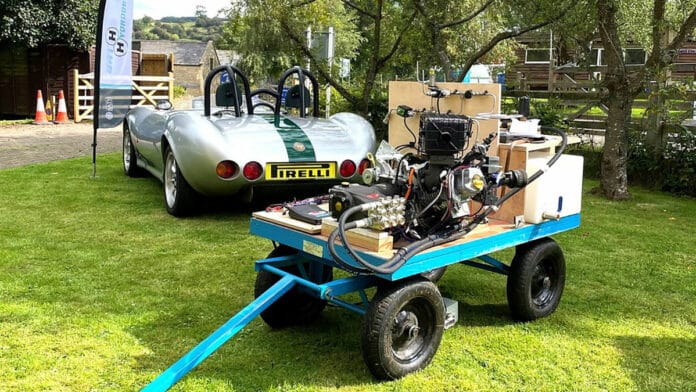Hydrogen-fueled combustion engines have been designed to power a wide range of vehicles, from race cars to pleasure boats. Recently, a group of engineering students at the University of Bath has successfully built a hydrogen-burning prototype engine and are currently testing it in hopes of setting an all-out land speed record.
The Bath Hydrogen engineering team has devised the idea of a hydrogen combustion-engine world record tour to showcase their pioneering efforts in the hydrogen space. The University of Bath is committed to becoming a leader in the research, production, storage, distribution, and end-use of hydrogen and carriers like ammonia.
The Bath Hydrogen team members switched on their prototype engine in March when it ran at the first attempt. This achievement made them the world’s first undergraduate students to develop and run a hydrogen-powered internal combustion engine.
There are no commercially available hydrogen-powered internal combustion engines at the moment, making their work all the more pioneering. However, major automotive manufacturers are also working on this technology.
“Starting the engine for the first time was a nerve-wracking moment, so we were delighted when it ran at the first attempt. It was a great validation of all our hard work,” Bath Hydrogen technical lead Nicholas Burt said. “We are using a test rig now before moving on to adapting the engine we’ll make the record attempt in, and we’ve learned so much about how to redesign and engineer that through this process. The support we’ve had from our early sponsors and from around the University has been invaluable.”
Bath Hydrogen has decided to concentrate its efforts on developing a hydrogen-powered race car. This move is in response to the molecule’s potential for being a zero-carbon fuel source and the forthcoming ban on sales of new petrol and diesel cars from 2035. The University’s extensive research experience in employing hydrogen as a fuel and energy storage medium has also contributed to this decision.
The Bath Hydrogen engine is a modified version of a single-cylinder generator engine supplied by sponsor Vanguard (Briggs & Stratton). The unit was selected as a test bed due to its relative simplicity, potential for adaptation, and generous support from the company.
The support from Vanguard, Link Engine Management, who provided a specialist electronic control unit (ECU), and Clean Air Power, which provided the engine’s new hydrogen-specific fuel injectors, has definitely played a crucial role in this project.
The team is using the test engine to refine their techniques and capabilities before moving on to the next project with the 2.3-liter Ford Ecoboost engine to use hydrogen fuel, using learnings gleaned from developing the current engine prototype. The Ford unit will be installed in a Ginetta G20 racing car, which will be used to attempt various land speed class records with the hydrogen-fueled internal combustion engine (known as a H2ICE).
While hydrogen has numerous advantages over petrol, such as its eco-friendliness due to no CO2 production, it does indeed pose several challenges. One of the most significant ones is its low energy density per unit volume, which makes it challenging to store enough fuel in the vehicle. To overcome this, hydrogen needs to be either stored as a compressed gas at high pressure or a liquid at extremely low temperatures, both of which have their own set of challenges compared to petrol.
The Bath team working on modifying the engine to run on hydrogen has quite a task at hand. Besides figuring out how to make the engine work with hydrogen, they also have to take into account the challenges associated with using hydrogen as a fuel. The team’s plans involve incorporating a fueling system that meets FIA standards and a fire suppression system to ensure safety. As of now, the prototype engine is mounted on a cart and is remotely controlled to comply with safety regulations.
The Hydrogen team is made up of 15 students in their third and fourth years who have expertise in various engineering fields, such as automotive and electrical engineering. This team is one of the successors to the University’s Team Bath Formula Student racing team, which was discontinued in 2022 to concentrate on zero-emission vehicles.
The team’s academic supervisor, Dr Kevin Robinson, added: “Many of us believe that the internal combustion engine still has an important role to play in moving towards net zero, using hydrogen and synthetic fuels in certain niche areas. Getting the prototype engine running has been a very significant milestone in this project. It’s still early days, but we have completed about three hours of continuous operation so far, including several minutes at full load. All the systems put in place are working well and are producing valuable data. There is a lot of work still to do, but this has been a very promising start”.
Bath has multiple student engineering teams working on various innovative projects, including racing teams such as Team Bath Racing Electric and Team Bath Zero. Additionally, other teams are working on unique projects like racing drones, rockets, water quality monitors, and even artificial hearts.
